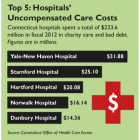I-Team In-Depth
Hospitals Bill More Than $1 Billion In Facility Fees Over Two Years
|
Connecticut consumers were billed for more than $1 billion in facility fees for outpatient services in 2015 and 2016, documents filed with the state Office of Health Care Access (OHCA) show. Twenty-two of Connecticut’s 30 hospitals charged these fees, bringing in $600.7 million in 2015 and another $488.8 million in 2016, according to an analysis by Conn. Health I-Team. The state’s two largest hospital systems, Yale New Haven Health and Hartford HealthCare, accounted for almost half of the total facility fee revenue in 2016. Yale and its four hospitals billed $144.3 million; Hartford and its five hospitals, $80.9 million.



